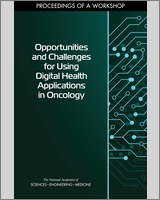NCBI Bookshelf. A service of the National Library of Medicine, National Institutes of Health.
Digital health encompasses a broad array of tools and strategies with the goals of advancing research, increasing health care access and quality, and making care more personalized. It encompasses health content, digital health interventions, and digital applications, such as communication tools connecting patients and clinicians (e.g., secure email in the patient portal, text, chat, video visit), remote monitoring tools, clinical decision support tools, and systems for exchanging health information. Patient-facing tools, tools for clinicians, and systems to facilitate research and care improvement are all part of this diverse landscape, and each raises unique opportunities and potential challenges.
To examine key policy issues for the effective and safe development, implementation, and use of digital health technologies in oncology research and care, the National Cancer Policy Forum of the National Academies of Sciences, Engineering, and Medicine held a virtual workshop in collaboration with the Forum on Cyber Resilience. The workshop, Opportunities and Challenges for Using Digital Health Applications in Oncology, held on July 13-14, 2020, convened a broad group of experts, including clinicians and researchers; patient advocates; and representatives of federal agencies, health professional societies, health care organizations, insurers, and the pharmaceutical and health technology industries. Many workshop speakers found the opportunities presented by digital health tools to be particularly compelling for oncology; however, capitalizing on these opportunities necessitates careful attention to the design, implementation, and use of digital health technologies. This publication summarizes the presentations and discussions from the workshop.
Contents
Suggested citation:
National Academies of Sciences, Engineering, and Medicine. 2021. Opportunities and challenges for using digital health applications in oncology: Proceedings of a workshop. Washington, DC: The National Academies Press. https://doi.org/10.17226/26286.
Digital Object Identifier: https://doi.org/10.17226/26286
Additional copies of this publication are available from the National Academies Press, 500 Fifth Street, NW, Keck 360, Washington, DC 20001; (800) 624-6242 or (202) 334-3313; http://www.nap.edu.
Printed in the United States of America
